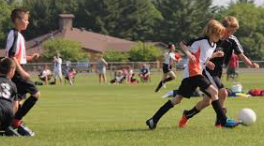There is a very old song by a man called Harry Belafonte, that came in the form of a conversation between a husband and wife, entitled, ‘There’s a hole in my bucket’. The husband advises his wife (as only husbands can do) that there is a hole in his bucket, to which she responds “Well, fix it, dear Henry”. This only causes him to ask with what he should fix it but for every response that she gives her husband he comes up with another problem. It all comes full circle when he asks her with what he should carry the water that he needs to use and she tells him to “Use the bucket, dear Henry”, only to be reminded that there is a hole in the bucket…
At times we might feel the same way about school sport; there is a hole in it, out of which our youngsters are slipping away. How can we fix it then, without going round in circles or ending up at the same place? We have quoted previously a national hockey team exhorting its government to “prioritise and promote the importance of team sport” while creating more opportunities. How can we create more opportunities for, and inspire, our children to have a life-long participation in sport?
At school, pupils tend only to do things which they are told to do. They play sport because they have to do so. They support the school at fixtures when they are told to do so. However, we must get to the point where they play sport because they want to play sport and where they recognise the pleasure, value and benefit of doing so – even those youngsters who initially do not have any love for any sport. All schools have done is inculcate the desperate need to win to gain any validity (despite school values saying that a child’s sense of worth or esteem is not dependant on results).
More than that, though, we need teams to face regular strong competition in order for players to develop. Neither our players or our sport will develop if there are only a few strong teams (who are taking the best players from weaker schools in order to get better results); players need to be playing against strong opposition week in, week out, in order for them to learn and to develop. In that regard, therefore, all schools need to be preparing teams to play. We need to think bigger.
Parents would do well to pause for a moment before jumping in and sending their sporty child to a school that often wins. One former Headmaster used to coach his school’s Under 14C cricket team and found that many of the youngsters in that team had played in their Primary School’s First XI and had chosen that Senior school because they hoped their child would play for Zimbabwe and had therefore chosen that school because they usually won. The parents did not consider that there were many other children whose parents had the same mindset. Consequently, not only did these children not play for Zimbabwe they did not even play for their A or B school age group team.
Furthermore, those same parents should perhaps have reflected further and realised that, by playing for a team which always won, their child would not be stretched, challenged or pushed, and therefore would not improve. The child who plays for the C (even the A and B) team would have been better advised going to a school which was not as strong as the others for, firstly, the child would most likely play for the first team (even earlier) and secondly, the child would be competing against stronger opponents and therefore improve by being challenged regularly.
A similar situation affects our national representation teams. While there is not strong competition on a weekly basis at club level throughout a whole season, players will not develop. They need to face strong opposition in order to grow and develop as a player and as a person.
Above all, however, we need in our school sport to be giving our youngsters not simply the opportunity and privilege of representing the school in fixtures but also giving them responsibility on the field of play. For as long as coaches are shouting instructions throughout the match, the children will learn nothing. They are like the husband, constantly asking what he should do.
We need to fix the hole in our school sport that is causing youngsters to give up sport as soon as they leave school. We need to develop their love of sport and give them all equal opportunities to thrive and develop. We believe in holistic education but not education that has holes in it. Fix it!




